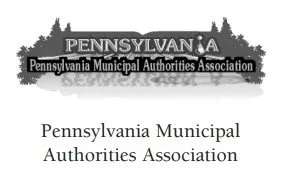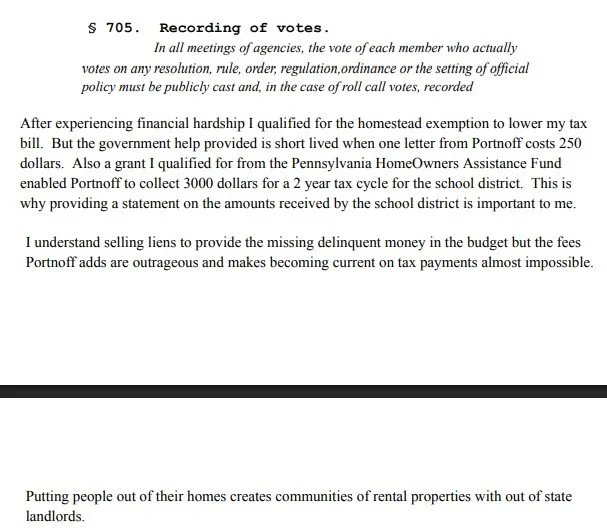I’m writing this letter in response to the Panther Valley School Board voting to raise the millage rate. Panther Valley’s median income is ranked 467 out of 499 school districts in Pennsylvania. Yet we’re taxed 10th highest.
Inflation affects everyone and it’s hard to feel sympathy for a district that wants to take money away from our basic needs while planning a new school construction project.
The Taxpayer Relief Act provides school districts the means to lower property taxes. The Dept of Education's website states 1,118,722.82 is allocated to Panther Valley for the upcoming school year. Also “Local governments implementing homestead exclusions may not increase the millage rate on real estate to offset the revenue lost by the reduction in the tax base.”
Panther Valley has created a community of blight and rental properties by putting people out of their homes for a 500 dollar tax bill that was inflated to 3000 from excessive fees. Homes are bought at tax sales for investments and aren’t being maintained.
By investing in distress they sell the liens for approximately 60 cents on the dollar. The loan, interest and fees are paid by the delinquent homeowners. A big investor in this process is PLGIT. (Pennsylvania’s local government investment trust)
Local governments invest money into the trust and the trust purchases the liens. The district is paying multiple agencies to let them profit on the interest of government tax free bonds. On paper this resembles a Ponzi scheme. Agreeing to allocate future revenue to that debt makes economic growth as a desperation, not as a credible strategy for success.
The lack of transparency in this district is concerning. My right to know request was answered with silence and my appeal has earned condescending remarks
.
Local tax enforcement by third party debt collectors and hedge funds exploit the hardships in communities, and extract their wealth and property. As a homeowner approaching retirement age, it’s concerning to see a district that values tax revenue more than the people that make up the community.
Assignment of Liens-
In researching this I found another questionable act, this pertains to my district specifically but I’m sure its the standard practice.
If your taxes are delinquent:
A lien is placed on your home (by Portnoff as acting solicitor for the district) A
Portnoff begins adding fees to the lien. This triples the original amount.
The district sells the liens to Public Asset Management. B
Public Asset Management is the Luzerne County Redevelopment Company. Acting under an alternate name and filing under a non-profit.
Redevelopment companies may act as land banks but under the jurisdiction that created them. (Carbon county)((?))
The money is provided by Municipal Revenue Services averaging 60 cents to the dollar. PAM holds liens for collateral. C
Bonds are issued for the debt (Gov’t tax free) by Stifel (?) and investors profit from interest. D
This process was overseen by PFM Management. E
Delinquent homeowners pay the full amount plus fees, interest and costs. F
Portnoff collects for PAM for their fees and distributes the tax amount and interest to the various companies. G
The district receives none since they were paid by PAM.
A big investor in this process is the PLGIT which invests the municipalities and districts money, which makes it possible that the district actually bought the liens it sold. H
Homeowner paid tax, 10% interest, penalties, county charges, costs and attorney fees. Portnoff collected fees, PAM received 2% interest, MRS received 3% interest, PFM received 27% of any profit, PLGIT receives 5% interest and Stifel gets a profit in percentage.
PLGIT pays sponsorship fees to 6 local gov’t associations I
The homeowner is usually the most vulnerable person in the community because this predatory system targets poor communities and tax liens tend to affect people with no mortgage, predominantly seniors. And these investors profit from the invest in distress schemes. Homes get sold for taxes but the equity is stolen.
I’m sure this outline is flawed in many parts from my research but my right to know request I submitted to the district was eventually answered with an affidavit claiming to not have any documents that I requested but I believe as close as I could come this seems nothing more than a ponzi scheme. The lack of transparency is also very concerning.
Portnoff later provided the documents the district swore didn't exist. \
Is Portnoff responsible for this investment scheme? 100% in my opinion. Id never be able to prove it though. Kate Harper sponsored the bill that let these investments happen and she was also on Michele Portnoffs campaign donor lists around that time. Mr Portnoff (Schley) is an investment banker/lawyer.Her biggest recipients of donations are on the Allentown Redev. And now a treasurer of PA.
I do believe its worth looking in to, even just to show how the illusion of wealth is created by issuing debt that makes economic growth as a desperation, not as a credible strategy for success.
Also the homeowner loses their house, the district gets a percentage of taxes for the option of immediate cash while private companies, lawyers and bankers profit. I hope someone can agree this system only benefits private companies and debt collectors. None of them were needed in tax collection for local governments.

H
C
D
F
B
A
E
G
I
Tax lien investing is a multibillion-dollar industry in America today, increasingly dominated by hedge funds and private equity firms. It is also a fundamentally predatory enterprise. It utilizes the machinery of local tax enforcement to exploit the hardships and misfortunes of struggling homeowners, and extract their wealth and property. Its chief victims, both the homeowners whose tax liens are purchased and those in the surrounding neighborhoods who suffer collateral damage, are poor, elderly, and disproportionately Black and Latino. Any attempts to promote greater access, affordability, and equity in U.S. housing markets—and undo the damage from exploitative practices in the past—must first attack the financial forces that profit from and exacerbate those inequities today, and the laws that let them do it.
LEFT WITH NOTHING
As the housing market soared, the investors scooped up liens in every corner of the city, then started charging homeowners thousands in legal fees and other costs that far exceeded their original tax bills, with rates for attorneys reaching $450 an hour













